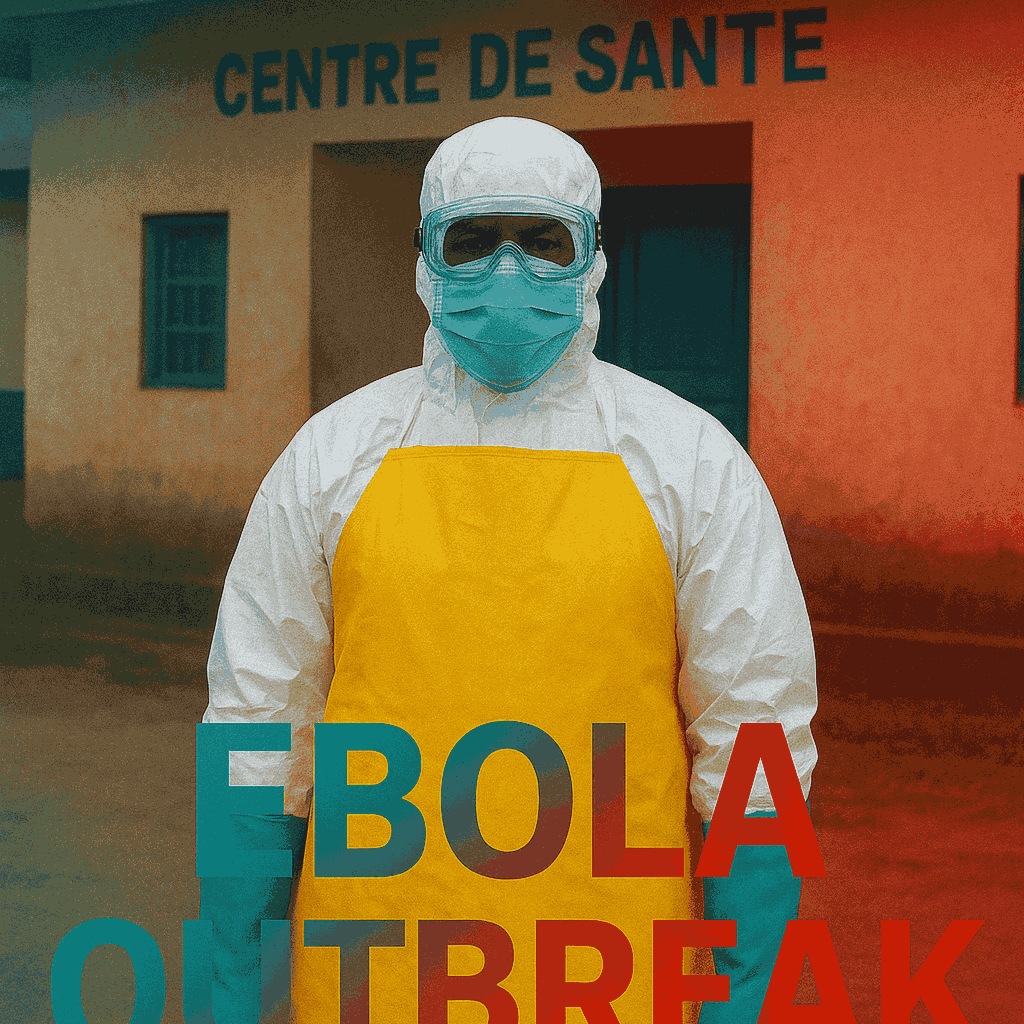Written and Reviewed By: Pharmacally Medical News Desk
Democratic Republic of the Congo declares Ebola outbreak in Kasai province after 28 suspected cases and 15 deaths, including four health workers. WHO and national teams have deployed rapid response and laboratory support.
The World Health Organization officially declared a new Ebola outbreak in the Democratic Republic of the Congo on 4 September 2025. The outbreak is clustered in the Bulape and Mweka health zones of Kasai province, located in the southern-central part of the country. As of the latest reports, 28 suspected cases have been identified, with 15 deaths, giving a provisional case fatality rate of about 54 percent. Among those who have died, four were health-care workers.. Laboratory analysis confirmed the presence of Ebola virus (Zaire ebolavirus) through PCR and GeneXpert testing, as well as whole genome sequencing. Sequencing data suggest this outbreak stems from a new zoonotic spillover event (fresh introduction of the virus from its animal reservoir into the human population) rather than a continuation of earlier transmission chains.
Background on the virus
Ebola virus disease is caused by viruses in the genus Ebolavirus. The Zaire strain is associated with the highest case fatality rates seen in human outbreaks. Transmission occurs through direct contact with blood or other bodily fluids of symptomatic cases, contaminated fomites, and during unsafe burials. Incubation is typically 2 to 21 days. Clinical presentation ranges from fever, myalgia, and gastrointestinal symptoms to bleeding and multiorgan failure in severe cases. Standard outbreak containing tool include case finding, isolation and clinical care, infection prevention in health facilities, contact tracing, safe and dignified burials, risk communication, and where available, targeted vaccination of contacts and front-line workers.
Official reports about outbreak
The DRC Ministry of Health alerted WHO on 1 September 2025 after clusters of patients with fever, vomiting, diarrhoea, haemorrhage, and rapid clinical deterioration were identified in Bulape General Reference Hospital and surrounding communities. The suspected index case was a 34-week pregnant woman admitted on 20 August who later died. Samples from several suspected cases were tested at the National Institute for Biomedical Research in Kinshasa and confirmed Ebola Zaire on 3 September. Whole genome data indicate this is a new zoonotic spillover event rather than a direct continuation of outbreaks from previous years.
Immediate public health response
WHO, the DRC Rapid Response Team, and partner agencies have deployed epidemiologists, infection Preventionist, Clinical Laboratory Scientist, case management, and risk communication experts to Kasai. Supplies sent include personal protective equipment, mobile laboratory equipment, and clinical materials. Provincial authorities have begun active case finding, isolation of suspect and confirmed cases, contact tracing, and community engagement to explain protective measures. Authorities are monitoring for cross-border risk because Kasai borders Angola.
Clinical management and health worker protection
Doctors and nurses treat Ebola patients by giving fluids, correcting electrolytes, treating common infections, providing oxygen if needed, and closely watching for organ failure. Health workers face a very high risk of infection, so strict use of protective equipment is essential. The death of four health workers in this outbreak shows that protective gear was missing, delayed, or not used properly in the early stages. In response, teams are now training staff quickly, sending more protective equipment, and enforcing strict triage in health facilities to reduce further risk.
Vaccines and therapeutics
For Zaire ebolavirus, health teams use the licensed rVSV-ZEBOV (Ervebo) vaccine in ring vaccination, which protects contacts of confirmed cases and frontline workers. The DRC keeps emergency vaccine stocks from past outbreaks, and WHO partners can also help deliver them when needed. Doctors can also treat patients with monoclonal antibodies and some antiviral drugs that proved effective in earlier outbreaks. However, these medicines and vaccines only work if supplies are available, the cold chain is maintained, and clear case definitions guide their uses.
Risk assessment
Current size: the outbreak is relatively small by aggregate numbers but shows a high provisional case fatality rate and early health-worker infections. This makes rapid containment urgency.
Transmission potential: Zaire ebolavirus can spread quickly in settings with delayed detection, limited infection control, and traditional burial practices. Rapid case finding, isolation, and safe burials can reduce spread.
International spread: risk is limited if local containment measures are successful. Border screening and information sharing with neighboring countries are advisable; given Kasai is bordering with Angola.
Recommendations for clinicians and public health teams
Immediately apply strict triage for febrile patients with bleeding or gastrointestinal symptoms and isolate suspects.
Use appropriate PPE and follow infection prevention protocols in all patient contacts. Provide refresher training to facility staff.
Prioritize rapid safe, dignified burial procedures and communicate with families.
Deploy rapid diagnostic testing and ensure safe sample transport to INRB or mobile labs.
Implement ring vaccination for eligible contacts and front-line workers if vaccine is available and community acceptance is achieved.
Bottom Line
This is a confirmed Ebola Zaire outbreak in Kasai province that requires immediate, well-coordinated public health action. The early numbers are small but severe. Rapid deployment of case finding, laboratory confirmation, infection control, community engagement, and targeted vaccination are the confirmed measures that can stop spread. Continued transparent information from health authorities and partners will be essential to track further spread of the outbreak.
References
Ebola virus disease – Democratic Republic of the Congo, 05 September 2025, World Health Organization, https://www.who.int/emergencies/disease-outbreak-news/item/2025-DON580
Democratic Republic of the Congo declares Ebola virus disease outbreak in Kasai Province, 04 September 2025, World Health Organization, https://www.afro.who.int/countries/democratic-republic-of-congo/news/democratic-republic-congo-declares-ebola-virus-disease-outbreak-kasai-province
New Ebola Outbreak Confirmed in the Democratic Republic of Congo, 04 Sept 2025, Africa CDC, https://africacdc.org/news-item/new-ebola-outbreak-confirmed-in-the-democratic-republic-of-congo/
DR Congo declares Ebola outbreak in Kasai province, 04 September 2025, CIDRAP, https://www.cidrap.umn.edu/ebola/dr-congo-declares-ebola-outbreak-kasai-province

